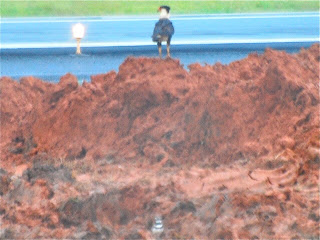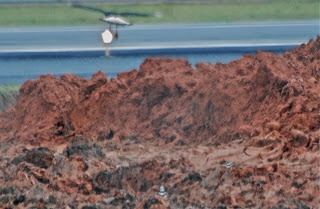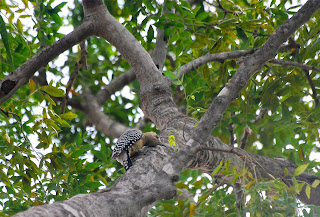After a successful morning in Las Macanas marsh, Osvaldo Quintero, Euclides "Kilo" Campos and your blogger host headed to the Aguadulce Salinas (saltponds) around noon, trying to take advantage of the not-so-high high tide. As you can imagine, the place was hot as a boiler, and we only saw scattered shorebirds, mainly Least and Semipalmated Sandpipers plus two Collared Plovers. We also saw a Merlin chasing the shorebirds (making it a five-Falco-falcons-species day) and many herons... but one in the distance caught my attention: it was "dancing". We  approached it, confirming it was an immature white morph Reddish Egret, probably the first ever reported for Aguadulce (all others had been dark morphs). We think this is only the third report of the white morph for Panama, with a previous one in El Agallito (Herrera) and the other in Pedasi (Los Santos), both in the Azuero Peninsula. We only stayed enough to take good photos and left the place, finding a big flock of Black-necked Stilts accompanied by five Stilt Sandpipers that probably stayed for the winter (usually only a transient in Panama) at the pond in
approached it, confirming it was an immature white morph Reddish Egret, probably the first ever reported for Aguadulce (all others had been dark morphs). We think this is only the third report of the white morph for Panama, with a previous one in El Agallito (Herrera) and the other in Pedasi (Los Santos), both in the Azuero Peninsula. We only stayed enough to take good photos and left the place, finding a big flock of Black-necked Stilts accompanied by five Stilt Sandpipers that probably stayed for the winter (usually only a transient in Panama) at the pond in  front of the "Turicentro". We lunched in Penonome, and in the way back to Panama City, tried the spot in Punta Chame where Kilo reported the VERY rare (for Panama) American White Pelican. When we reached the place, we found a big flock of Brown Pelicans... but not the big whites. We stayed for a while, watching a flock of sandpipers and plover that included both Semipalmated and Wilson's Plovers (making it a six-plovers-species day) and an adult male Belted Kingfisher hovering over the water and occasionally plunge-diving. The
front of the "Turicentro". We lunched in Penonome, and in the way back to Panama City, tried the spot in Punta Chame where Kilo reported the VERY rare (for Panama) American White Pelican. When we reached the place, we found a big flock of Brown Pelicans... but not the big whites. We stayed for a while, watching a flock of sandpipers and plover that included both Semipalmated and Wilson's Plovers (making it a six-plovers-species day) and an adult male Belted Kingfisher hovering over the water and occasionally plunge-diving. The pond was separated of the sea by a dike, so we decided to check it and the beach. When we started to walk the dike, the Brown Pelicans flew to the beach, leaving the pond. Again, no whites were seen. From the dike, we inspected the sandy beach, finding a Great Blue Heron and several American Oystercatchers. We amused ourselves watching these and many others birds, including Sandwich and Royal Terns, Black-bellied Plovers, and so on... only for insistence we checked back the pond, seeing in the distance two pelicans' silhouettes in a sand bank. Kilo aimed his scope and rapidly confirmed they were THE birds: two American White Pelicans preening and resting!!! They simply materialized there because we didn't see them approaching or flying... and they were exactly were we just checked few minutes before. A HUGE lifer, Kilo's report was only the third for Panama! I got some nice pictures despite the distance.
pond was separated of the sea by a dike, so we decided to check it and the beach. When we started to walk the dike, the Brown Pelicans flew to the beach, leaving the pond. Again, no whites were seen. From the dike, we inspected the sandy beach, finding a Great Blue Heron and several American Oystercatchers. We amused ourselves watching these and many others birds, including Sandwich and Royal Terns, Black-bellied Plovers, and so on... only for insistence we checked back the pond, seeing in the distance two pelicans' silhouettes in a sand bank. Kilo aimed his scope and rapidly confirmed they were THE birds: two American White Pelicans preening and resting!!! They simply materialized there because we didn't see them approaching or flying... and they were exactly were we just checked few minutes before. A HUGE lifer, Kilo's report was only the third for Panama! I got some nice pictures despite the distance.


 approached it, confirming it was an immature white morph Reddish Egret, probably the first ever reported for Aguadulce (all others had been dark morphs). We think this is only the third report of the white morph for Panama, with a previous one in El Agallito (Herrera) and the other in Pedasi (Los Santos), both in the Azuero Peninsula. We only stayed enough to take good photos and left the place, finding a big flock of Black-necked Stilts accompanied by five Stilt Sandpipers that probably stayed for the winter (usually only a transient in Panama) at the pond in
approached it, confirming it was an immature white morph Reddish Egret, probably the first ever reported for Aguadulce (all others had been dark morphs). We think this is only the third report of the white morph for Panama, with a previous one in El Agallito (Herrera) and the other in Pedasi (Los Santos), both in the Azuero Peninsula. We only stayed enough to take good photos and left the place, finding a big flock of Black-necked Stilts accompanied by five Stilt Sandpipers that probably stayed for the winter (usually only a transient in Panama) at the pond in  front of the "Turicentro". We lunched in Penonome, and in the way back to Panama City, tried the spot in Punta Chame where Kilo reported the VERY rare (for Panama) American White Pelican. When we reached the place, we found a big flock of Brown Pelicans... but not the big whites. We stayed for a while, watching a flock of sandpipers and plover that included both Semipalmated and Wilson's Plovers (making it a six-plovers-species day) and an adult male Belted Kingfisher hovering over the water and occasionally plunge-diving. The
front of the "Turicentro". We lunched in Penonome, and in the way back to Panama City, tried the spot in Punta Chame where Kilo reported the VERY rare (for Panama) American White Pelican. When we reached the place, we found a big flock of Brown Pelicans... but not the big whites. We stayed for a while, watching a flock of sandpipers and plover that included both Semipalmated and Wilson's Plovers (making it a six-plovers-species day) and an adult male Belted Kingfisher hovering over the water and occasionally plunge-diving. The pond was separated of the sea by a dike, so we decided to check it and the beach. When we started to walk the dike, the Brown Pelicans flew to the beach, leaving the pond. Again, no whites were seen. From the dike, we inspected the sandy beach, finding a Great Blue Heron and several American Oystercatchers. We amused ourselves watching these and many others birds, including Sandwich and Royal Terns, Black-bellied Plovers, and so on... only for insistence we checked back the pond, seeing in the distance two pelicans' silhouettes in a sand bank. Kilo aimed his scope and rapidly confirmed they were THE birds: two American White Pelicans preening and resting!!! They simply materialized there because we didn't see them approaching or flying... and they were exactly were we just checked few minutes before. A HUGE lifer, Kilo's report was only the third for Panama! I got some nice pictures despite the distance.
pond was separated of the sea by a dike, so we decided to check it and the beach. When we started to walk the dike, the Brown Pelicans flew to the beach, leaving the pond. Again, no whites were seen. From the dike, we inspected the sandy beach, finding a Great Blue Heron and several American Oystercatchers. We amused ourselves watching these and many others birds, including Sandwich and Royal Terns, Black-bellied Plovers, and so on... only for insistence we checked back the pond, seeing in the distance two pelicans' silhouettes in a sand bank. Kilo aimed his scope and rapidly confirmed they were THE birds: two American White Pelicans preening and resting!!! They simply materialized there because we didn't see them approaching or flying... and they were exactly were we just checked few minutes before. A HUGE lifer, Kilo's report was only the third for Panama! I got some nice pictures despite the distance.


And what about the nemesis? A nemesis is a bird that, despite all your efforts, you can not find (and everyone ask: how is it possible that you have not found that common bird?). Well, the Striped Cuckoo was Osvaldo's nemesis. Close to Panama City, I suggested to try a spot close to the entrance to Farfan (close to the Pan American Highway). There, I played the cuckoo tape while Osvaldo was setting his camera... and after a few seconds the Striped Cuckoo appeared and perched in the telephone wire for just two seconds! Osvaldo demonstrated why we call him the fastest camera of the west by managing to take three photos of the bird... which is no longer his nemesis. Great way to end a day full of rare birds and lifers!
















 Yesterday, I went with Gloriela, Osvaldo Quintero, Rafael Luck and Euclides "Kilo" Campo to the
Yesterday, I went with Gloriela, Osvaldo Quintero, Rafael Luck and Euclides "Kilo" Campo to the 






































